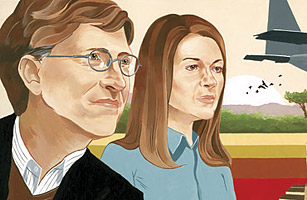
Every year malaria kills 1 million people — most of them African children under age 5. When Microsoft co-founder Bill Gates, 50, and his wife Melinda, 41, were looking for ways to give away their prodigious wealth, they assumed that such monumental problems were being worked on. Instead, Melinda says, they found a "vacuum that does need to be stepped into."
Step they did: the Gates Foundation now provides more than a third of the world's entire malaria-research funding, and it's paying off. The most effective drug to treat the disease, naturally occurring artemisinin, is in devastatingly short supply. But last month Gates-funded scientists announced that they had created the technology to manufacture artemisinic acid synthetically. Within five years, the cost of a lifesaving supply is expected to drop from $2.40 to 25 cents. Lead researcher Jay Keasling says it would not have been possible without a $43 million Gates grant. "I had companies call me and say, 'This is great, but we can't give you any money. We can't make a profit on this,'" he says.
But even if millions are saved from malaria, there will be more diseases and more death. The Gateses' most profound influence has been to change expectations. Their belief that every life should have equal value, backed by their $29 billion endowment in the foundation, has injected hope not only into global health but also into their other priorities: public education, public libraries and at-risk families. The couple demands from grantees the same relentless focus on results expected of Microsoft employees and takes away the classic excuse for failure: not enough money. They have inspired others—from medical students, who are entering global-health fields in unprecedented numbers, to governments, which are putting billions into Gates initiatives. Says Jimmy Carter: "This is the most important foundation in the world."